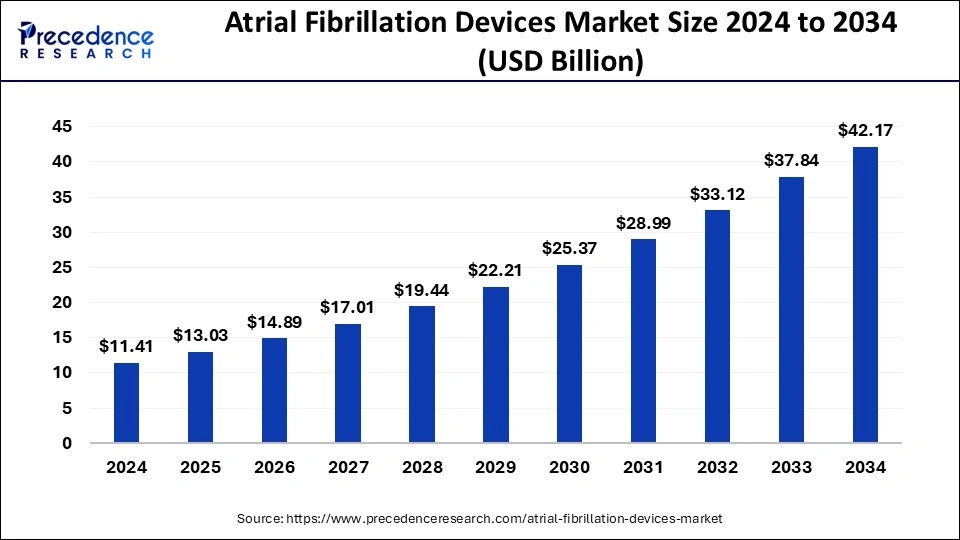- North America dominated the market share of 40% in 2023.
- By product, the EP ablation catheters segment dominated the atrial fibrillation devices market in 2023.
- By end-use, the hospitals segment dominated the market in 2023.

Get a Sample: https://www.precedenceresearch.com/sample/3950
Growth Factors:
Several factors contribute to the growth of the atrial fibrillation devices market. One of the primary drivers is the increasing awareness and diagnosis of atrial fibrillation among healthcare professionals and patients. Advances in medical technology have led to improved screening methods and diagnostic tools, enabling early detection and intervention for atrial fibrillation. Additionally, the growing adoption of minimally invasive procedures, such as catheter ablation, for the treatment of atrial fibrillation is driving the demand for AF devices. These procedures offer patients less pain, shorter recovery times, and lower risks compared to traditional surgical approaches, thereby fueling market growth. Furthermore, the expanding elderly population, who are at higher risk of developing atrial fibrillation, is expected to drive the demand for AF devices in the coming years.
Region Insights:
The atrial fibrillation devices market exhibits regional variations in terms of market size, growth rate, and regulatory landscape. North America dominates the market, driven by the high prevalence of atrial fibrillation, well-established healthcare infrastructure, and significant investments in research and development. Europe follows closely, with countries like Germany, France, and the UK contributing to market growth. The Asia-Pacific region is poised to witness rapid growth due to increasing healthcare expenditure, rising awareness about atrial fibrillation, and the presence of a large patient pool. Moreover, emerging economies in Latin America and the Middle East & Africa are also experiencing growing demand for AF devices, driven by improving healthcare infrastructure and rising healthcare expenditure.
Atrial Fibrillation Devices Market Scope
| Report Coverage | Details |
| Growth Rate from 2024 to 2033 | CAGR of 14.25% |
| Global Market Size in 2023 | USD 9.99 Billion |
| Global Market Size by 2033 | USD 37.84 Billion |
| U.S. Market Size in 2023 | USD 3 Billion |
| U.S. Market Size by 2033 | USD 11.35 Billion |
| Base Year | 2023 |
| Forecast Period | 2024 to 2033 |
| Segments Covered | By Product and By End-use |
| Regions Covered | North America, Europe, Asia-Pacific, Latin America, and Middle East & Africa |
Atrial Fibrillation Devices Market Dynamics
Drivers:
Several factors drive the demand for atrial fibrillation devices. Firstly, the increasing prevalence of atrial fibrillation worldwide, particularly among the aging population, is a significant driver for market growth. As the number of elderly individuals grows, the incidence of atrial fibrillation and related complications also increases, driving the demand for AF devices. Secondly, advancements in technology have led to the development of innovative devices and treatment modalities for atrial fibrillation, enhancing patient outcomes and driving market growth. Additionally, favorable reimbursement policies for AF devices in many countries encourage healthcare providers and patients to adopt these technologies, further stimulating market growth.
Opportunities:
The atrial fibrillation devices market presents several opportunities for growth and innovation. Firstly, there is a growing emphasis on personalized medicine and precision healthcare, creating opportunities for the development of tailored treatment approaches for atrial fibrillation patients. Advanced technologies such as artificial intelligence and machine learning can be leveraged to analyze patient data and optimize treatment strategies, leading to better outcomes. Furthermore, there is an opportunity to expand the market by targeting underdiagnosed and undertreated populations, particularly in emerging markets where awareness about atrial fibrillation may be low. Additionally, collaborations between medical device companies, healthcare providers, and research institutions can drive innovation and accelerate the development of new AF devices and therapies.
Challenges:
Despite the promising growth prospects, the atrial fibrillation devices market faces several challenges. One of the primary challenges is the stringent regulatory approval process for medical devices, which can significantly delay product launches and increase development costs. Moreover, the high cost of AF devices may limit their accessibility, particularly in developing countries with limited healthcare resources. Another challenge is the risk of complications associated with AF device implantation and procedures, such as infection, bleeding, and device malfunction. Healthcare providers need to carefully weigh the risks and benefits of these interventions to ensure optimal patient outcomes. Additionally, the lack of skilled healthcare professionals trained in performing complex AF procedures, such as catheter ablation, poses a challenge to market growth, particularly in regions with limited access to specialized care.
Read Also: Cardiac Arrhythmia Monitoring Devices Market Size, Report 2033
Recent Developments
- In November 2023, Medtronic introduced a heart implant to reduce the lifetime risk of stroke in patients with atrial fibrillation and improve the quality of life for patients undergoing open cardiac surgery.
- In January 2022, AliveCor, Inc. and Voluntis, a leading Aptar Pharma firm in digital therapies, have partnered to provide advanced management of atrial fibrillation for cancer patients.
Atrial Fibrillation Devices Market Companies
- Abbott Laboratories
- Johnson & Johnson
- Atricure Inc
- Microport Scientific Corporation
- Boston Scientific Corporation
- St. Jude Medical, Inc
- Medtronic Plc
- Koninklijke Philips N.V.
- Siemens AG
Segments Covered in the Report
By Product
- EP Ablation Catheters
- EP Diagnostic Catheters
- Mapping and Recording Systems
- Cardiac Monitors or Implantable Loop Recorder
- Access Devices
- Intracardiac Echocardiography (ICE)
- Left Atrial Appendage (LAA) Closure Devices
By End-use
- Hospitals
- Cardiac Centers
- Ambulatory Surgical Centers
- Others
By Geography
- North America
- Europe
- Asia-Pacific
- Latin America
- Middle East and Africa
Contact Us:
Mr. Alex
Sales Manager
Call: +1 9197 992 333
Email: sales@precedenceresearch.com
Web: https://www.precedenceresearch.com
Blog: https://www.expresswebwire.com/
Blog: https://www.uswebwire.com/
